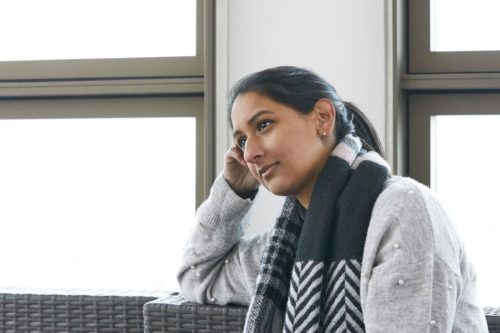Taiyeba’s experience of chronic migraine and cluster headache
After years of telling my GP that I couldn’t cope, I was finally referred to a neurologist
Struggling as a child
I have a vivid memory from about the age of seven, on a family holiday complaining about a pain that I was struggling to explain. I couldn’t open my eyes fully and the sun was making everything so uncomfortable for me. I was getting tired as the pain took over and then finally the vomiting came along. My parents were perplexed. On our return my mum took me to the GP, and we were told to wait and see if this happened again. By the age of 12, what I now know were migraine attacks, were happening much more frequently.
Now I have been diagnosed with chronic migraine and chronic cluster headaches. I was 21 when I was officially diagnosed. Before 21 I had been to hospital having blacked out, lost all feeling on one side, lost my peripheral vision and vomited until the acidity became too much.
Dealing with the pain
My husband moans at me for not showing how I feel most of the time. This habit has come from trying very hard to push past my pain, nausea, limitations and frustration that comes with migraine. I never want to miss out, assume that I can’t manage work, etc because of my dark shadow of pain. Moreover, I worry that I would achieve less than those around me if I gave in to my migraine.
The most challenging aspect of having (on a bad month) between 15-20 migraine attacks a month is trying to get on with life. Ideally, I’d crawl into bed in a cool dark room at every attack. But, this means I am left with 10-15 days to actually work, see friends and enjoy family. The problem with ‘pushing through’ and masking pain with a smile is that I’ve become accustomed to vomiting most days, being snappy and moody with the people I love and cutting short the time I spend with friends.
Explaining the impact
I struggle to explain the debilitating nature of migraine. At university, people around me had no clue what I was dealing with and I had no idea how to explain it for fear of being weird and moaning. Over time, I was asked to do things less as people just thought I would rather be alone in my room. They had no idea what was going behind my door. If I could explain, maybe my experience would’ve been different. I found that even friends and family thought I was perhaps exaggerating or complaining too much.

With these reactions, I felt less able to talk about what I was feeling – for fear of judgement. Often when I have a migraine attack, I need to stay very still. I may be sitting down when a family member asks me to come to them or help out and I have to muster a lot of strength to get up or move. To them, it looked lazy, like I just wasn’t bothered. Today my family are incredibly understanding.
After years of returning to my GP telling them that I couldn’t cope, crying as I explained my pain and keeping diaries, I was finally referred. Following my diagnosis, I was so emotional. Finally, people who understood and told me I wasn’t alone and that there was more that could help. I have since found preventive medication that have reduced the number of migraine attacks a month, how long they last, and the nausea and vomiting. I have used nerve blocks injections and Botox when my migraine attacks do spiral, to calm everything down.
Cluster headache
I have now also been diagnosed with cluster headaches. I was on honeymoon when I had my first ever attack. I woke at 3am with what I felt like worst migraine attack ever. I didn’t know what to do. I ran to the hotel room toilet and began to pace then began to bang my head on the floor. It felt like a screwdriver going through both my temple and eye simultaneously. I believed that my head was about to split open. I couldn’t muster the extra energy to cry. My Headache Specialist explained that I had a cluster headache (also known as Suicide Headaches – I didn’t even need to ask why).
I have given myself black eyes, passed out and bled from my extreme physical reactions during attacks. For a few months a year, I am woken at exactly 3am with a cluster headache. I’m always exhausted after an attack and going in to work is draining.
Impact on work
I explained to my previous employer about my new diagnosis. I felt that it was vital that they understand what I am dealing with so that I could make the most of their flexible working policy. This included working from home as needed or adjusting my hours. Their flexible working policy encouraged my decision to accept this role initially. I learnt almost a year later that unless your management see the benefit of a policy, reaping the benefits for myself would prove impossible. I learnt that if I worked from home to control my environment it was being recorded as a sick day. I later began to be docked pay, as I had used all my sick leave.
Following multiple conversations with my manager, their manager, and HR, I grew tired of questions and comments such as, “I understand that you need to work from home, but there is a benefit to being seen in the office daily”, “I don’t understand why a headache is lasting more than a day?”, “Why can’t you take painkillers?”, “Have you ever been told that you shouldn’t be working full time?”, “Maybe this job isn’t in your skill set”, and “Have you ever been diagnosed with a mental illness?”. I lost hope thinking and the more stressed I became the more my migraine began to spiral out of control.
Importance of understanding and support
I have a new job where I am treated so differently. I truly believe (as obvious as it sounds) that the right environment can truly impact your mental state which has a huge knock on effect your health, and in my case, migraine. My symptoms can terrify me, even to this day.

As scared as I am I feel as though I am learning each day that taking care of yourself is key. I am happier for it.


